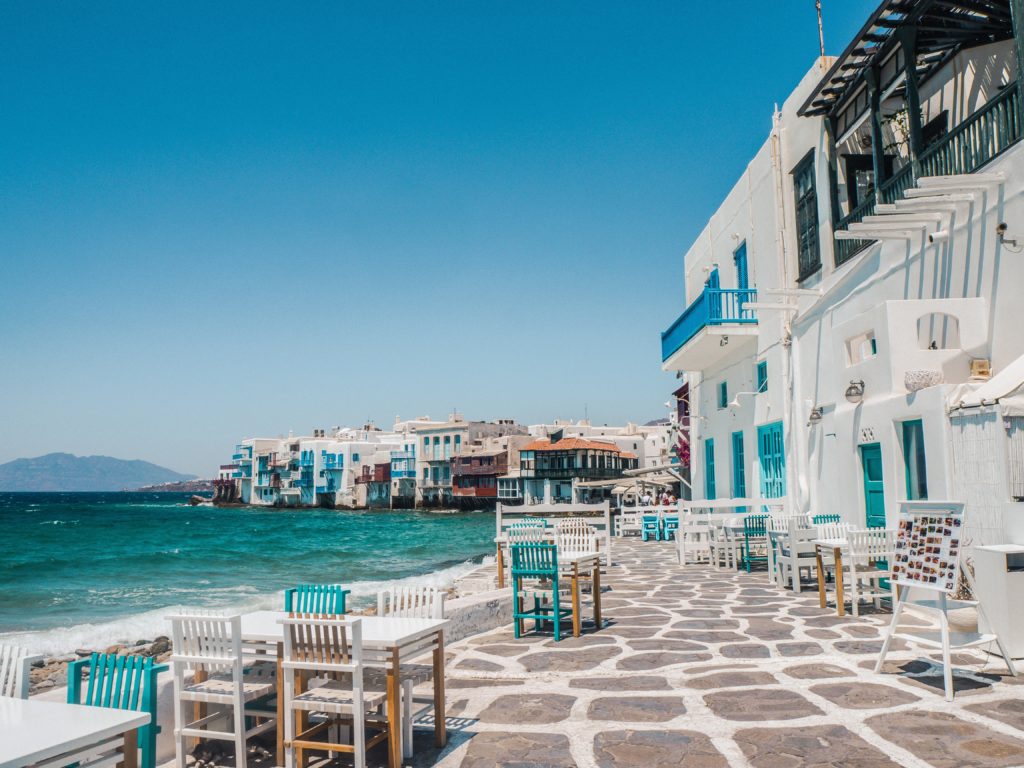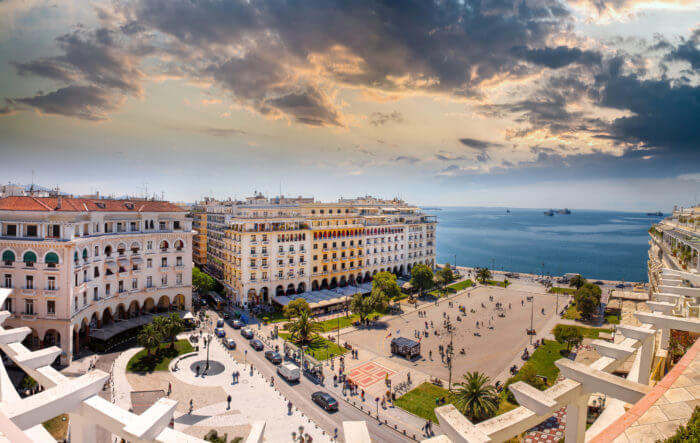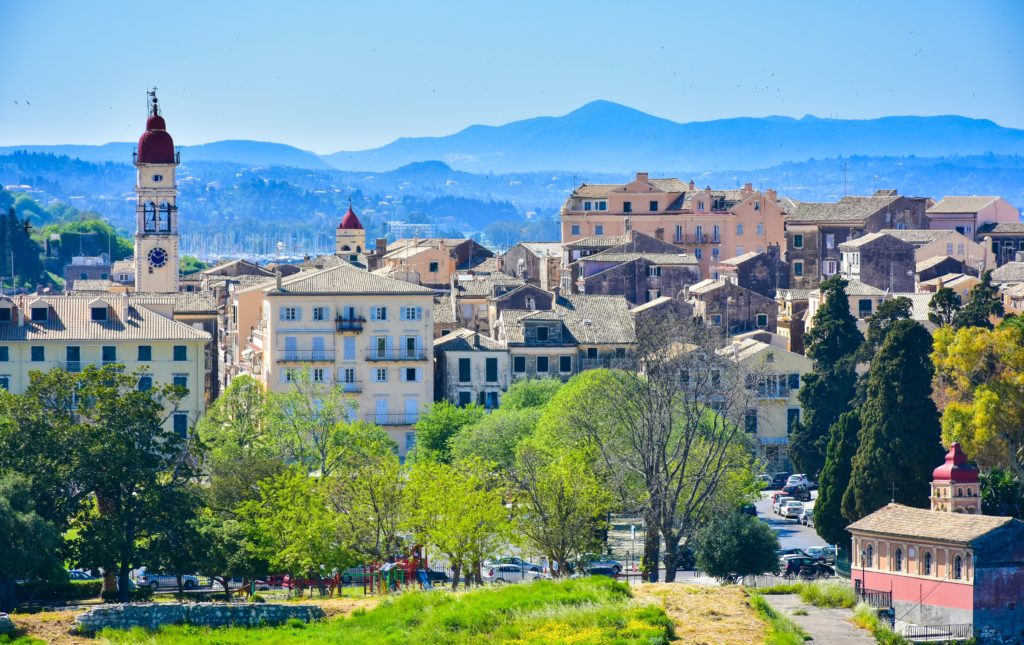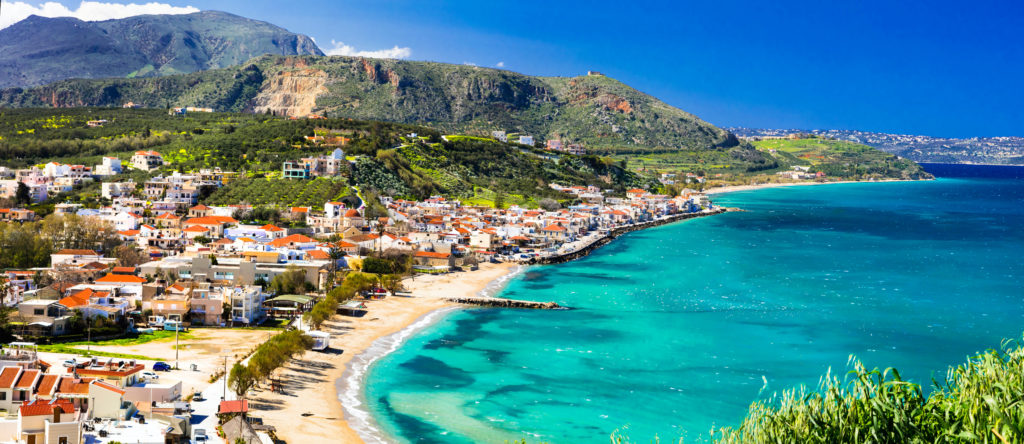- Guides
Our Top 10 Tips to Finding Friends Abroad
Let’s face it, moving abroad, where everything is unfamiliar, can feel like a bit of a maze. You’re struggling with...
Read moreGuides
The captivating combination of ancient mythology and hedonism has made Greece one of the most fascinating countries in the world. Cradle of the Western civilization, the Hellenic Republic (its official name) is a collection of beautiful scenery, millenary culture and history, delicious cuisine, and passionate people that still attracts those who really want to experience the authentic Mediterranean laid back lifestyle despite the financial hardship of the last decade.
Globetrotters can hop from island to island until they drop, surrounded by turquoise-coloured seas, open-air museums and dainty white villas that characterize the Greek coastline. In the mainland, throbbing cities and stunning natural beauty shape the landscape full of life and seduce many international companies that do not hesitate to establish their headquarters in this part of Eastern Europe.

Expats have plenty of options when it comes to accommodation in Greece. Whether considering a white-washed blockhouse with blue shutters in Santorini, a villa in Crete, an apartment in the suburbs of Athens or Thessaloniki or a townhouse in Corfu's green valleys, there are indeed housing alternatives for everyone. With rent prices becoming significantly cheaper all over the country due to the financial situation, the chances are that expats can find a reasonably priced apartment even in the centre of the capital! The pricing in the rest of the country is more affordable, as long as "touristy areas" are avoided.
As many expats want to settle in Athens and Thessaloniki (where most of the expat working opportunities are located), it's convenient to have a closer look at the best neighbourhoods to live in and the rental prices in these cities:
Wherever you move, you can start looking for an apartment or room before your relocation by browsing Facebook Groups or Online portals. Moreover, real estate agents can help you find a better place once you get there, but keep in mind that many people in Greece prefer posting their properties online. Most classified ads are in Greek, so knowing the basic terms will facilitate your accommodation search: a studio is a "garsionera"; a 1-bedroom apartment is a "dyari", with 2-bedrooms "triari", and the word "enoikiazetai" means "for rent".
Regarding the lease agreements, expats should be prepared to pay a deposit of 2-3 months' rent for long-term rentals in Greece. Although Greeks are not usually strict with lease contracts, Greek law requires a rental agreement to be valid for a minimum of 3 years with a minimum of one month's notice. But again - this is something that you can always negotiate with your landlord. Remember that the contract will most likely be in Greek. Make sure that a friend or employer helps you understand what it includes before signing it. Additionally, be sure what the contract says regarding the utilities ("koinoxrista"). Many utility accounts are included in the rental cost, but it could be possible that you will have to handle this on your own, which adds an extra expense on top of the rent.
A fun fact about living in Greece is that, in some cities, you can actually drink tap water. Although it's not the general norm, in bigger cities such as Thessaloniki the water from the tap is deemed safe.


Greece delivers. The country has endless options whether you are more into cultural and historical pursuits or are seeking the calm of fishing villages bathed with sparkling blue water. Indeed, those who decide to live in Greece will always have something new to explore, including the Greeks' joyful way of living!
If you are going to settle in the mainland, a weekend (at least) in the capital Athens is a great way to start discovering the country. Visible from almost everywhere within the city, the Acropolis, an ancient citadel located on a rocky mound, is considered the symbol of Greece and the landmark of Western civilization. Crowned by the Parthenon, don't overlook the Temple of Athena Nike, the Erechtheion, or the Theater of Dionysus, to name a few. These several monuments and temples gradually change their colour during the day: from the pure white marble to a honey hue that blends with the sunset. Something that you need to witness!
But Athens is more than the Acropolis. For example, The National Garden offers a beautiful retreat from the bustle of the concrete capital. A hike to the top of Mount Lycabettus, the highest point of Athens, is a test of endurance but totally worth it to see the city's magnificence.
On the other side of the country, the second-largest city, Thessaloniki, is also worth a mention. With streets full of life and vibrancy, ancient and new cohabit uniquely. The White Tower and the old Heptapyrgion Fortress, the city's trademarks, are vantage points where you can also look out over the city.

Not so far away from Athens and Thessaloniki, you can also find two of the country's most spiritual and mystical places. On one side, the UNESCO World Heritage site Delphi will let your imagination fly by its haunting ruins - ancients came here on pilgrimages to worship Apollo and ask advice from the mythical Oracle. On the other side, the rock formations of Meteora, with the Byzantine monasteries on top, are a strange but incredible landscape that also offers tremendous opportunities for walkers and climbers.
However, it is impossible to boast the beauty of Greece without mentioning its islands. Divided into 7 groups, they offer a plethora of diverse panoramas and invite all kinds of people whether they are looking for a cosmopolitan or secluded atmosphere. Beyond their idyllic beaches, the Cyclades (including Santorini, Mykonos, and Paros islands) with their snow-white villages are the perfect combination of archaeological sites and postcards that come to life, with amazing sunsets and sunrises. If you are more into discovering treasures, Rhodes old town and the whole island of Crete present enchanting scenery, where you can travel back in time and enjoy their natural beauty. Special mention here to the colourful historical villas in Chania, Crete that give life to the Venetian harbour and the waterfront promenade. In the Ionian sea, Zakynthos has plenty of forested wilderness and rural villages. The Marine Park with its sea turtles is a remarkable spectacle for those who are looking for lifelong memories.
Last, we recommend adding to all this mix the culinary delights of the Greek and Mediterranean diet. Feta cheese, Greek olives, the Spanakopita (spinach pie) and the famous Moussaka (most traditional dish) will definitely become your favourite snacks and dishes. Moreover, the cafes and restaurants are pure reflections of Greek people's way of living and socializing and the place to be if you really want to experience and be immersed in the Greek culture.
The cost of living in Greece is unusually affordable for Europe. Although the salaries are pretty low, it’s still possible to live well on an average salary. In other words, with a low budget, you can live without worrying too much about your finances. However, there are two aspects to keep in mind:
| Athens | |
| Groceries | |
| 1 kg oranges | €0.97 |
| 12 eggs1 kg potatoes | €3€0.81 |
| Restaurant/cafe | |
| Beer (0,5 l) | €4 |
| Meal for 2 at restaurant | €40 |
| Cappuccino | €2.82 |
| Indulgence and health | |
| Gym membership | €26 |
| Cinema ticket | €8 |
| Public transport | |
| Single ticket bus | €1.4 |
| Taxi (normal tariff - 1km) | €0.75 |
| Average salary | €800-1.150 |
Something that is good to know is that many shops expect you to pay with cash and therefore don’t even offer a card machine at the checkout. For this reason, it is good always to have some cash with you. You can find an ATM for this purpose on almost every street corner in every city or town in Greece.
Travelling around Greece by public transport is fairly easy thanks to a comprehensive transport network. If you want to reach the smallest Greek villages, the KTEL buses are the most convenient and primary form of transport. Most cities are linked to Athens and Thessaloniki, and islands such as Corfu are also accessible by bus. Generally, Greek buses are safe and reliable, with expected delays during rush hours. The major routes are:
In addition, many ferries connect the different islands in the Adriatic and the Aegean seas. These ferries are very convenient during Summer as they increase their frequency both for national and international routes (observing those sunsets and sunrises from the ferry is something to experience!). However, only a few routes remain operational from December and February, so it’s usually better to move by plane. There are 15 international airports in Greece for international and domestic flights, so you won’t have to worry about getting to an island or the other side of the country!
Unfortunately, the other side of the coin is the railway network, very limited in the Greek territory. Although they experienced a significant update when the Olympic Games took place in 2004, the railway services are still improving and far from European standards. Greek Railways Organisation operates trains in Greece through two main lines: from Athens to Thessaloniki and Athens to Patra. In most cases, the train fare is cheaper than the bus ticket.
As in other EU countries, roads in Greece are of high quality, and the driving is on the right side. Although they are not considered the most considerate drivers, Greek people are usually polite on the road. In case of doubt, drive defensively and just let the locals go first!

By logic, you will meet people from many nationalities in Greece, especially in Athens, Thessaloniki and Crete. And at your new job, you will most likely find people your age and similar backgrounds and lifestyles. If you are searching specifically for people from your country to discuss experiences with or get advice from, social media is usually the best place to go. You can use the same Facebook groups you joined to find apartments, as there are often other expats looking to meet up and get to know new people.
It could also be fun to get to know some of the locals. Greece is a part of Europe, but it is also a Mediterranian country, and in these countries, the locals have a bit of a laid back attitude to life. However, what is unique from Greece is their traditions when it comes to family and living arrangements. In other words, it is a very family-oriented country, and many locals have a big family and strong connections to their parents even as adults. If you befriend some locals, it is not uncommon that they will invite you over to their family home for lunch or dinner and to meet their family!
As you might know, the official language of Greece is Greek. It might be pretty overwhelming at first to see all the signs or public posters that you can’t figure out what they really mean. However, many Greeks, especially young people, have a decent knowledge of English. Even if it is not required at your workplace, it could be good to learn some of the most common phrases for your everyday social interactions so that you can communicate a little with the locals or older people:

Since the 08 financial crisis, Greece's economy has had some challenges. Although the economy seems to be going slowly back on track, the unemployment rate is still the highest in the European Union, at around 15% in May 2021. So, in front of this situation, what really makes Greece a viable option for expats that want to move and work abroad? Well, among a few things the Greek government is actually making a focused effort to attract expats talent and entrepreneurs, to give Greece’s economy a boost through 3 different job markets:
If you find a job you want to apply for in Greece, you should first and foremost make sure that your CV and cover letter are up to date and translated to English. Even if you are applying for a job at a company with its origin from your country, the people responsible for the hiring process might not speak your native language. Therefore, it is safest to go for a universal language!
Did you know that the Greek language has the word “philoxenia”, which literally means “love for strangers”? Yes, Greek people are known for their friendliness and openness to meeting new people and doing business with them, no matter where they come from! Greece is a collectivist society, and social life is essential for them. Therefore, meeting new people and making new friends is not as difficult as in other central or northern European countries.
As an expat, expect a society where schedules are not closely followed and where everybody tends to adopt a relaxed pace of life. This also applies in an international environment where you will be most likely going to work. Punctuality is not particularly important, but afternoon breaks are a norm in many people’s lives. But remember: you shouldn’t perceive Greeks as lazy people just for this reason - it’s just the way to structure their days!


As Greek culture is, in general terms, very laid back, business is often conducted over a coffee or during lunch. These informal meetings are, in fact, an essential part of developing a successful partnership between companies or just the way Greek people get to know employees, employers and colleagues. Therefore, things happen with a slow flow (a meeting can last several hours!). Small talk has a noticeable presence to develop trust before making any decisions or talking about more serious and in-depth topics. During a meeting, expect many interruptions and remember that the Greeks’ communication style is very emotional and intense, and they tend to get really loud! It is also typical that many conversations occur simultaneously as this is considered a way to encourage ideas. However, keep in mind that Greeks tend to have strong beliefs on religion and politics, so it would be a good idea not to bring up these topics.
There is no specific dress code at offices in Greece, but many Greeks make their first impressions based on the way someone is dressed, so this can make a big difference. However, as you will work in an international environment, you might keep the dress code casual.
Last, there are specific hand gestures that we use daily, but that could be misinterpreted in Greece. For example, the “Ok” sign, a “thumbs up”, or holding up your hand with all your fingers extended are considered offensive and insulting, so try to avoid these gestures (at least in public!)
The workweek in Greece is, in general, 40 hours. You can have overtime for up to 5 hours extra a week, but these additional hours are paid at a 20% rate higher than your regular wage and are not regarded as overtime. If you work more than 45 hours, the employer must pay 40% above your salary rate. Employees can only work for up to 120 overtime hours annually at this rate, and any additional hours must be paid at 80% of the employees’ regular salary.
In many companies, the first year of your employment is a so-called probation period. This means that you or the company have the right to terminate the contract during these months at any time, for example, if they don’t feel like you are the right fit or if that’s not the job for you.
You are legally entitled to 20 days of annual leave if you work 5 days a week or 24 days if you work six days, once you have worked an entire year with the same employer. However, part-timers are entitled to one-twelfth of the holiday for each month (25 days) of their employment after completing one year of work.
Employees in Greece are also entitled to salaries during sick leave. This entitlement from Social Security is applicable at 50% for the first three days of sick leave. From the fourth day, you are eligible for full sick leave pay upon presenting a medical certificate.

In the case of open-ended contracts (indefinite contracts) that extend beyond the trial period, the resignation notice depends on how long the company has employed you. The notice takes effect from the day after the employer is notified:
| From 1 year to 2 years | 1-month notice |
| From 2 to 5 years | 2 months’ notice |
| From 5 to 10 years | 3 months’ notice |
| Over 10 years | 4 months’ notice |
Greece is also one of the European countries where a National Minimum Wage is stipulated by law. This is currently €758.33/month for people over 18 years old. However, according to the General Confederation of Workers of Greece, Greece's average annual gross salary is around €1,150/month, and specialists and expats can earn much more! For example, a content writer can make more than €1,500/month, and in the development sector, the salaries stand around €2,000.
Greek workers are also entitled to bonuses through the year, which correspond to an extra two months' salary: an entire month for Christmas, half a month for Easter and half a month for summer vacation. On the other side, severance pay varies significantly depending on an employee's length of service. Starting at one month's salary for service between two months and a year, it gradually increases up to six months' salary for ten years of service.
Moreover, to understand your payslip in Greece, you need to have clear the contributions you make to the state as an employee, which are the following:
Regarding Greece's income tax rate, the Hellenic country uses a progressive system of tax brackets for calculating how much income tax should be deducted. Therefore, the bracket you fall into depends on your earnings. Remember that the social security contributions mentioned above (14%) come on top of your income tax Individuals in Greece pay income tax on the following scale:
A named "social solidarity contribution" tax ranging from 2,2% up to 10% is also imposed on all incomes above €12,000.
In summary, although the salaries might not be the highest in Europe, the affordable cost of living and the reasonable income tax rate balance out the situation and give you the opportunity of both saving money and enjoying what this beautiful country offers!
If you want to take a further look into the job market when you have arrived in Greece and build your professional network to expand your career prospects, there are many helpful websites where you can start with. For example, suppose you are interested in entrepreneur networking in Greece. In that case, you can join some of the groups listed on the Meetup site, where youngsters & professionals talk about business opportunities, new technologies and have all kinds of inspiring talks for innovation in all fields. Another option is joining the professional network on the InterNations website. Everybody, including entrepreneurs, employees or unemployed, freelancers or graduates, can share their experiences or ask for advice from other people in Greece and attend to the multiple activities (both online and in place) they arrange.

Since Greece is a part of the European Union, it is not difficult for European candidates to relocate here. You will not need a Visa or work permit, but you will have to apply for a Certificate of Registration or ID card if you plan to stay longer than three months (90 days). This Certificate is considered to be an acceptable form of identification while you live in the Hellenic country.
The application process for EU nationals to obtain this Certificate is as follows:
Note: as Greece has introduced a new format for this Certificate of Registration (called “biometric residence permit”), the same authorities will have to register your fingerprints to get your ID Card, which shows your right to live and work in Greece.
Moreover, it’s as crucial as this Certificate to apply for 2 different numbers:
Once the application has been handed in, the Eforia issues a document stating your AFM number, which is usually done immediately or just in a few days!
Note: remember that all these procedures are free of charge, except the ID-Card, which costs 16 euros.


The Greek National Health System (ESY) comprises a mix of public and private healthcare providers. Even though there might be some differences between the mainland and the country's smaller islands, the standard of healthcare in Greece is generally high.
After receiving your AMKA number (social security card), you are entitled to the national healthcare plan just as much as Greek citizens. However, you will have to register yourself with a GP. This is something that you can do online through your TAXISnet account (Greece's electronic services), which your employer would have previously set up. Once you are logged in, you can just follow this step-by-step guide to get a family doctor. Fortunately, most medical staff in Greece will speak a good level of English, though this might differ based on their position and the location of the hospital.
Greece's comprehensive healthcare system is supported by taxes and social security contributions made by employees and employers. There's no extra fee when making an appointment with your doctor or for other medical-related services (although there is a special fee if someone gets hospitalized).
As previously mentioned, even though the Greek healthcare system is ranked highly compared to other healthcare systems, many Greeks take out private healthcare insurance. They do this to avoid the long waiting times that characterize the system and ensure all necessary treatments are covered. For this reason, we recommend that you also consider taking out international private insurance, which protects you in Greece and wherever you go in the world!
Opening a bank account in Greece might seem a bit more challenging than in your home country or other countries you might have lived in. Although your employer might pay your salary to your current bank account during the first months, you should be aware of the currency exchange fees if you don’t use the Euro in your home country or if there are fees involved in international transactions.
Unfortunately, It is not currently possible to open a bank account online with Greek banks. You will need to go to the bank in person with all the necessary documentation and sign all the papers. The good news is that most banks allow you to fill out the application online, but that’s only one of the different documents you will have to hand in to complete the application. Remember that the opening hours are between 8 AM and 2 PM and only on weekdays, so you might have to take some time off work to get this fixed.
To open a bank account, you will need to bring the following documents:
Even if these documents should be enough for you to open a bank account, some banks might require additional documents, so it can be good to come prepared. These can include:
The appointment should be pretty straightforward - you will just hand all the documentation in and sign all the necessary papers. You will then be given the account number to make the minimum deposit, and after a few days or one week, you will receive your debit card in your mail.
When researching which bank fits better with your needs, be sure you look into the fees associated with each account. Greek banks tend to charge a setup fee monthly or yearly (read the fine print and ask everything that might not be clear regarding this matter). Moreover, it’s also common for banks to charge a fee for using an ATM outside their network. As previously mentioned, using cash is still pretty standard in the country, and some stores and restaurants don’t allow people to pay small amounts of money by card yet.
In summary, it is best to look up what the bank where you want to open an account says about fees and requirements before you go. The most famous Greek banks are Alpha Bank, Piraeus Bank, Eurobank and National Bank of Greece. You can also ask for advice from other expats, your colleagues and your employers!

Whether you're thinking of starting a new life on a picturesque island or in metropolitan Athens, Greece offers an ideal environment with a flexible work style, Mediterranean slow living and organized chaos. Here you can count on endless sunny days, thrill-seeking activities, shimmering beaches and rich culture and history that never seem to be completely explored. The country is also defined by its people loving life even at the most challenging times - something completely contagious for the newcomers!
With an apparent economic stabilization, Greece follows the path of progress, boasting of the challenges it can offer to expats and potential entrepreneurs who want to relocate. Ruled by hospitality, passion for digital transformation and innovation, Greece's job market welcomes talent from abroad that want to develop their career and expand their professional network.
So if you got enchanted by all that the Hellenic country offers, don't let the opportunity pass you by - check all the job vacancies in Greece that we offer here at Workwide Recruit!
Let’s face it, moving abroad, where everything is unfamiliar, can feel like a bit of a maze. You’re struggling with...
Read moreWelcome to the beating heart of Spain – Madrid! This bustling metropolis offers a unique blend of rich culture, historical...
Read more
